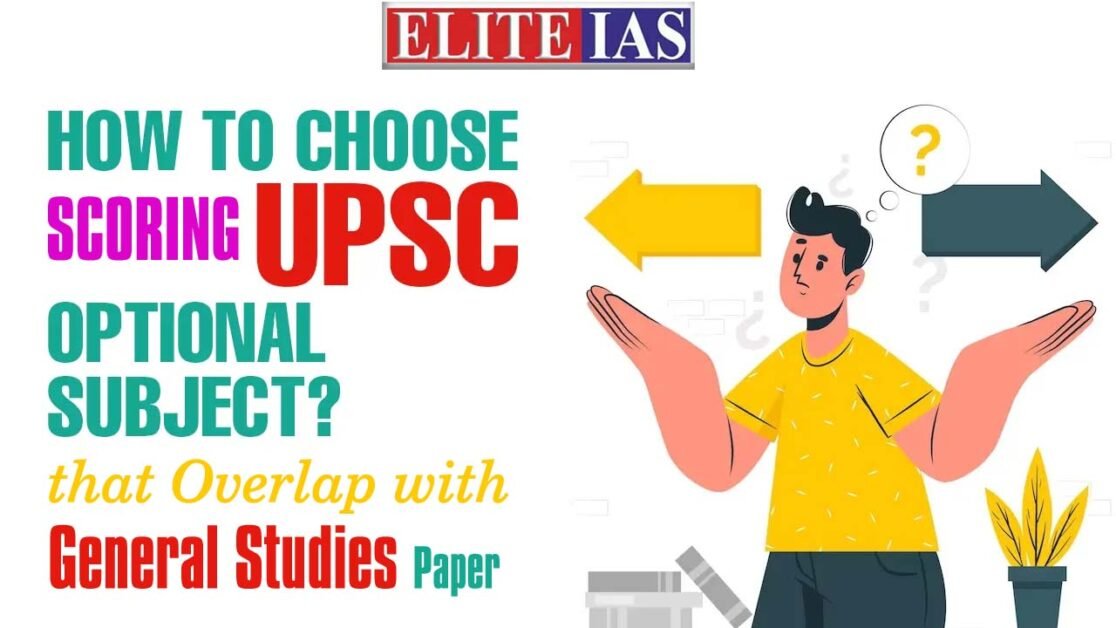
In the UPSC exams, students have to choose optional subjects that match their interests and help them prepare for the General Studies papers. This is the reason UPSC coaching in Delhi advice IAS aspirants to first join General Studies classes, and evolve their interest for a subject before optional subject. There are nine papers in the UPSC Mains exam, and two of them are optional subjects. These optional subjects cover a variety of topics, like humanities and sciences. People usually pick optional subjects that relate closely to the General Studies papers. This makes studying easier and improves their performance overall. Some optional subjects have a lot in common with the General Studies papers, which makes them popular choices. By choosing these subjects, students can study similar things for both their optional and compulsory papers, saving them time and effort. This helps them do better in the exam.
1. Sociology: Overlap with General Studies Paper I (Paper-1 Society, Paper-4 Ethics + Essay)
Sociology can be a powerful tool for the UPSC exam, especially if you find yourself drawn to social issues and how Indian society functions. It overlaps greatly with General Studies Paper I, Ethics i.e. Paper IV which covers these very topics. Also hugely helpful in Essay paper which contains 250 marks.
By choosing Sociology as an optional subject, you’ll get to explore the inner workings of social structures, like caste systems or family units, and the institutions that shape society, like education or religion. You’ll also learn about different theories that explain how societies evolve and change.
This deeper understanding will give you a toolbox for analyzing social issues and trends. Making it much easier to tackle questions in the UPSC Mains exam and Essay. It’s basically like getting a special lens to see the complexities of Indian society, which is super useful for the exam.
2. Political Science and International Relations (PSIR): Overlap with General Studies Paper II (Polity and International Relations) and Paper IV (Ethics)
Political Science and International Relations (PSIR) is a common optional subject for UPSC exams because it matches well with both General Studies Paper II and IV. It deals with things like how governments work, different political ideas, how countries relate to each other, and ethical questions. These topics are all important parts of the UPSC syllabus.
People who choose PSIR find it helpful because it gives them a good grasp of how politics and governance function, along with understanding ethical challenges. This helps them prepare for the exam in a well-rounded way. They don’t just learn about politics and international affairs, but also about how to think ethically about them. PSIR can make studying easier because it covers topics that come up in the General Studies papers.
So, by choosing PSIR, students can learn similar things for both their optional and compulsory papers. This makes studying more efficient and can improve their performance in the exam.
3. History: Overlap with General Studies Paper I (History and Culture)
Choosing history as an optional subject for the UPSC exams is a smart move because it connects well with General Studies Paper I, which concentrates on history and culture. When students pick history, they get to explore different time periods, significant events, and different viewpoints throughout history.
This helps them understand Indian and world history better. Besides, studying history as an optional subject also helps students develop analytical skills and critical thinking. These abilities are super important for doing well in the UPSC Mains exam. When you study history, you’re not just memorizing dates and facts, but you’re learning how to analyze and interpret them. This is crucial for answering questions effectively in the exam.
So, by choosing history as their optional subject, students are not only preparing for one part of the exam but also improving their overall skills, which can benefit them in other papers too. It’s like hitting two birds with one stone—they learn about history and develop important skills at the same time.
4. Geography: Overlap with General Studies Paper I (Geography)
The UPSC exam lets you choose an extra subject to study in depth. Geography is a great choice because it builds on what you already learn in General Studies Paper I. That paper touches on some geography, but choosing Geography as an extra subject lets you dive much deeper. You’ll learn advanced concepts like how the Earth’s landforms are shaped (physical geography), how humans interact with their environment (human geography), and how to analyze geographical data (geographical techniques).
This deeper knowledge will give you a major advantage in understanding the social and economic problems, environmental issues, and even the locations discussed throughout the UPSC syllabus. Basically, a strong grounding in Geography will give you a clearer picture of the world around you, which is super helpful for the UPSC exam.
5. Public Administration: Overlap with General Studies Paper II (Governance)
Public Administration is a commonly chosen optional subject for the UPSC exam because it overlaps well with General Studies Paper II. Paper II covers how India is governed, its constitution, and the way it functions. If you choose Public Administration, you’ll learn in detail about the theories behind running a government, how bureaucracies work, and how policies are created and put into action.
This deeper understanding of the nuts and bolts of governance will be a major asset when it comes to answering questions in the UPSC Mains exam. Essentially, Public Administration equips you with the knowledge of how the government runs, which is super useful for an exam focused on how India functions.
6. Economics: Overlap with General Studies Paper III
Strengthening your knowledge of Economics can significantly boost your performance in the UPSC exam, especially for General Studies Paper III. This paper covers a lot of ground on how India’s economy functions, including its development, budgeting, and ensuring everyone benefits from progress (inclusive growth).
By choosing Economics as an optional subject, you’ll dive deeper into economic theories. You’ll understand how the government spends its money (fiscal policy) and the challenges India faces in growing its economy.
This deeper understanding will be a game-changer. You’ll develop sharper analytical skills, allowing you to dissect and answer questions related to the economy, government spending, and how society progresses in a more insightful way. In simpler terms, Economics equips you to think critically about money, growth, and development – all key areas tested in the UPSC exam.
7. Anthropology: Overlap with General Studies Paper, particularly in GS paper I and II
Choosing Anthropology as an optional subject in the UPSC exam can give you a major edge, particularly when it comes to General Studies Paper I and II. These papers cover a lot about Indian society, its rich diversity, and the challenges faced by tribal communities.
By studying Anthropology, you’ll gain in-depth knowledge of anthropological concepts that explain how societies function. You’ll delve into the incredible variety of cultures across India and understand the unique ways tribal communities live.
This deeper understanding will make you a master of social dynamics, which is super useful for writing essays and answering questions about social issues, diversity, and how everyone can be included in India’s progress. Basically, Anthropology equips you to see the complexities of Indian society with a new lens, making you much stronger in areas that the UPSC exam emphasizes.
Strategic Benefits of Overlapping Subjects: Opting for an optional subject that overlaps with the GS syllabus offers several strategic advantages to UPSC aspirants:
Reduced Syllabus:
Selecting an optional subject that overlaps with your General Studies papers is a smart strategy for the UPSC exam. This way, you’ll be studying some material twice, which can save you time and effort.
Since you’re already familiar with some concepts and topics, you can focus on going deeper instead of learning everything from scratch. This frees up extra time to tackle other parts of the UPSC syllabus.
Interdisciplinary Understanding:
Picking an optional subject that overlaps with your General Studies subjects in the UPSC exam isn’t just about saving time. It actually strengthens your overall understanding. By studying related topics from different angles (sociology in GS and anthropology as an optional), you see the bigger picture.
This “joined-up” thinking develops your critical thinking and analysis skills, making you a pro at dissecting complex UPSC questions and crafting well-rounded answers.
Efficient Preparation:
When your UPSC optional subject overlaps with the General Studies papers, you become a master of efficiency. Imagine reusing the same study material for two subjects! You can combine your notes, use the same revision techniques, and practice answer writing for both using similar approaches.
This saves you tons of time and lets you focus your energy on areas unique to each subject. It’s like studying smarter, not harder, to ace the UPSC exam.
Scoring Potential:
Choosing an optional subject that overlaps with your General Studies subjects in the UPSC exam is a double win. Because you’ve already built a foundation in those areas, you’ll likely score higher in both the GS papers and the optional subject paper itself. This double boost to your score can significantly improve your chances of qualifying the entire UPSC Mains exam. It’s like getting a head start in two races at once!
Last but not the least, while UPSC preparation don’t forget to join Essay test series as well as test series for UPSC in General Studies.
Thus, choosing optional subjects that overlap with General Studies can be a smart move for the UPSC Mains. These subjects, like Public Administration or Sociology, often connect directly to specific GS papers. This overlap doesn’t just save time studying the same concepts twice, but also gives you a deeper understanding of those areas. This deeper knowledge makes you feel more confident and prepared to tackle the tough UPSC questions. However, remember, the best optional subject is still the one you find interesting and good at. Pick something that fits your strengths, so you can excel in both the GS and optional sections, maximizing your UPSC success!


